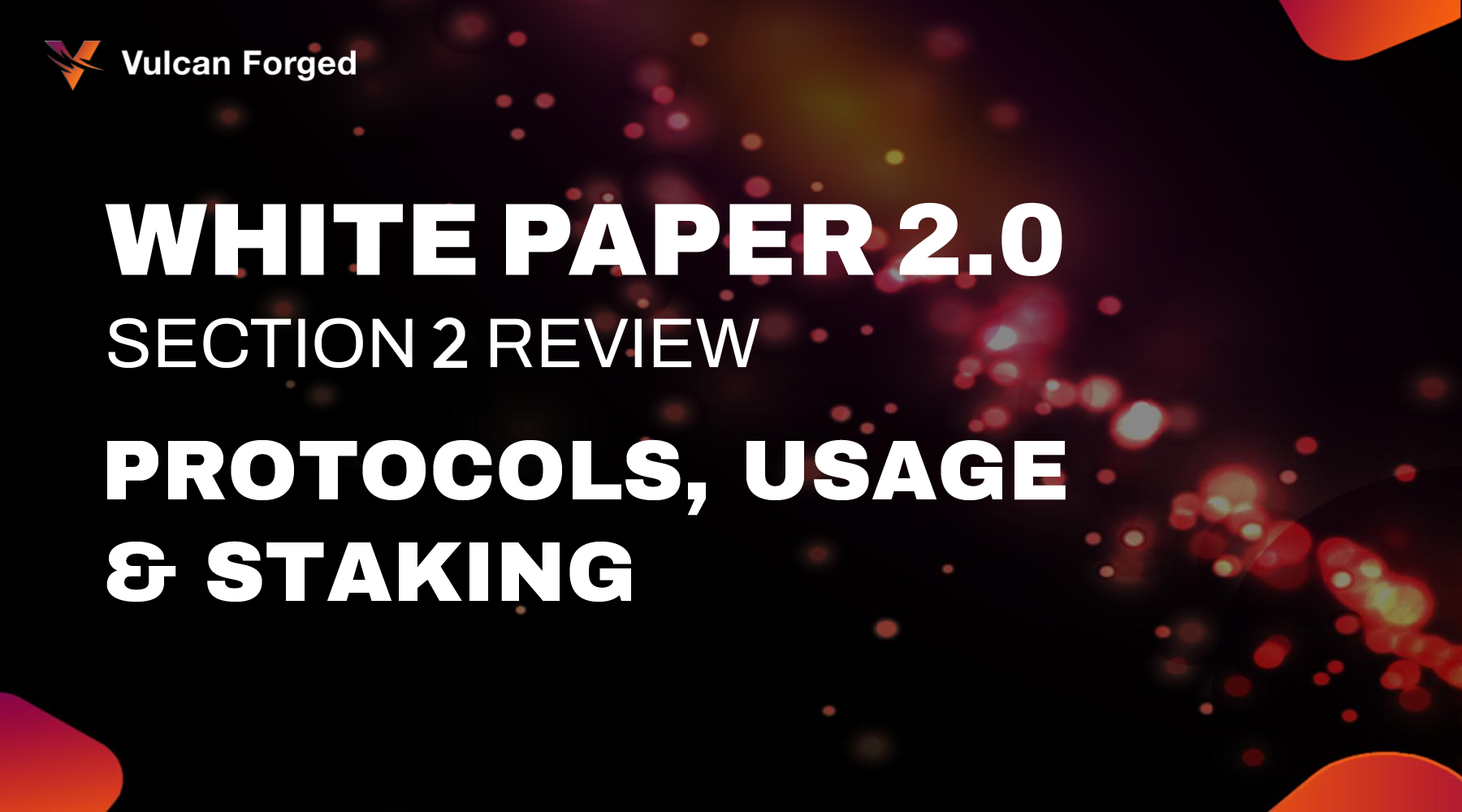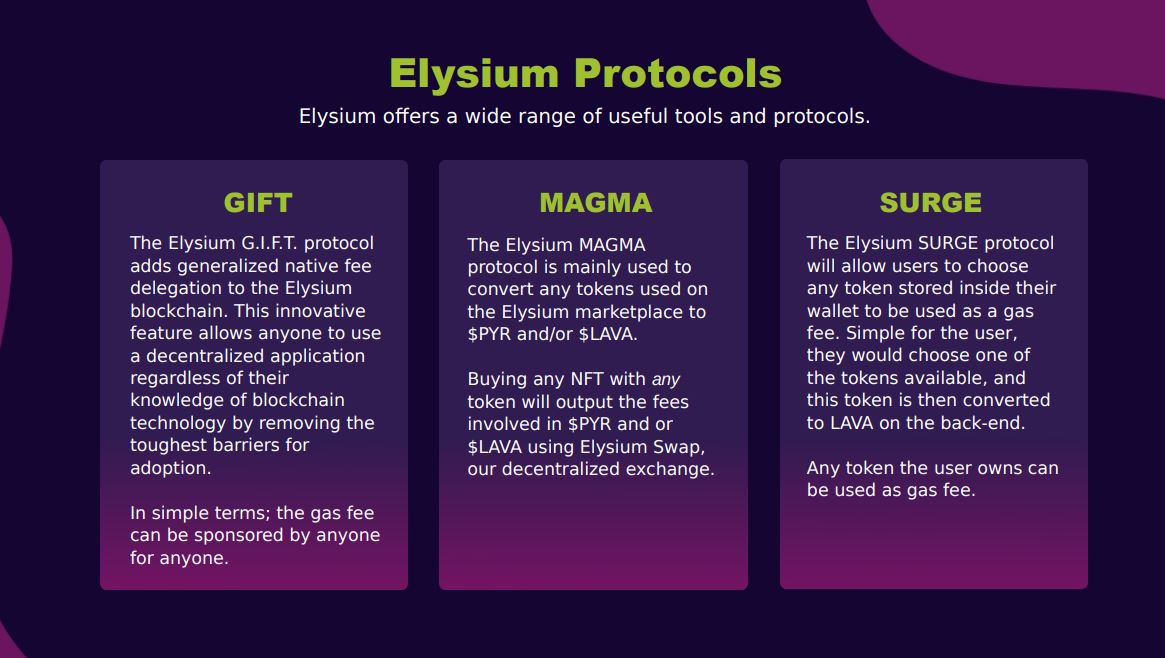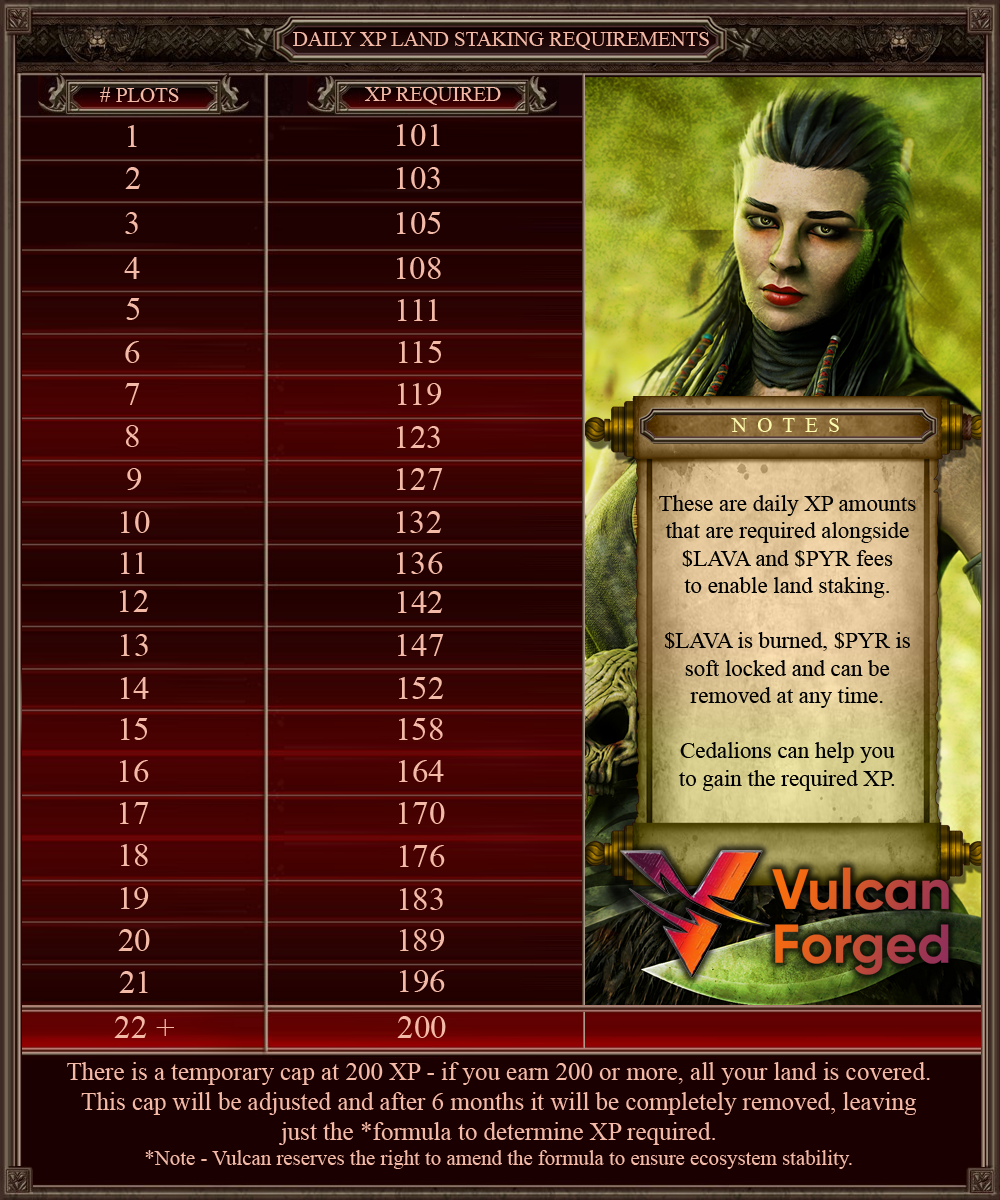
White Paper 2.0 | Section 2 Review | Protocols, Usage & Staking
Elysium Protocols
The Elysium blockchain offers a wide range of useful tools and protocols providing users with a seamless, easy to use process. We have three outstanding protocols allowing for flows to convert tokens used to $PYR, providing fee delegation – allowing the gas fee to be sponsored by anyone for anyone else and allowing users to make use of any token in their wallet as a gas fee:
MAGMA
The Elysium MAGMA protocol is mainly used to convert any tokens used on the Elysium Marketplace to $PYR and/or $LAVA. Buying any NFT with any token will output the fees involved in $PYR and or $LAVA using Elysium Swap, our decentralized exchange.
This streamlines the user experience by eliminating the need for manual conversions or the acquisition of specific tokens for transactions.
GIFT
The Elysium G.I.F.T. protocol adds generalized native fee delegation to the Elysium blockchain. This innovative feature allows anyone to use a decentralized application regardless of their knowledge of blockchain technology by removing the toughest barriers for adoption.
In simple terms; the gas fee can be sponsored by anyone for anyone. By addressing the gas fee pain point through G.I.F.T, individuals can enjoy the benefits of blockchain applications without worrying about transaction costs. Users can have their gas fees sponsored by other participants on the network, making it easier for newcomers to adopt and engage with the Elysium blockchain ecosystem.
SURGE
The Elysium SURGE protocol will allow users to choose any token stored inside their wallet to be used as a gas fee. Simple for the user, they would choose one of the tokens available, and
this token is then converted to LAVA on the back-end. Any token the user owns can be used as a gas fee, eliminating the need to hold a specific token purely for gas.
SURGE provides flexibility and convenience, allowing individuals and businesses to leverage their existing token holdings to cover transaction costs, enhancing overall usability and eliminating unnecessary friction.
Collectively, these protocols significantly enhance the ease of use for individuals and businesses on the Elysium blockchain. They simplify the token conversion process, remove barriers to adoption through fee delegation, and enable users to utilize any token in their wallet for gas feeS, promoting a user-friendly environment, making it more accessible for both newcomers and experienced participants to interact with Elysium’s gaming and metaverse ecosystem.

Daily Use Of The Elysium Blockchain: What Can A User Expect?
As with any blockchain, there are transaction costs. Our transaction cost for sending tokens is very low – approximately .006 LAVA. As covered in Elysium Protocols, the MAGMA protocol will convert any tokens used to LAVA, removing the need for manual conversion.
Current Average Gas Fees (July 2023):
ERC20 transfer: 0.000074 LAVA
LAVA Transfer: 0.0059 LAVA
NFT Transfer: 2 LAVA
For NFT minting: 6 LAVA
Speed
Elysium blockchain is fast – in fact, it’s as fast as we need it to be. Initially at 2,500 transactions per second (TPS), Elysium is fully scalable; with increased use, we can increase the speed to match. This section of the whitepaper outlines the scalability and TPS capabilities of Elysium Blockchain, built on the foundation of a Proof of Authority (PoA) consensus mechanism. It explains how the TPS of Elysium Blockchain can increase based on use, while highlighting the rationale for its initial TPS limit of 2,500.
Elysium Blockchain’s PoA Consensus:
Elysium Blockchain employs the PoA consensus mechanism, wherein a set of 51 trusted and reputable nodes are responsible for validating transactions and securing the network. The PoA consensus ensures fast transaction finality and high network reliability, making it suitable for gaming and metaverse environments.
Scalability Architecture:
Elysium Blockchain’s architecture is designed with scalability in mind. The network’s TPS can be increased based on demand and utilization. As the user base and transaction volume grow, the platform is equipped to scale dynamically to accommodate higher TPS requirements.
Initial TPS Limit of 2,500:
During the early stages of Elysium Blockchain’s adoption, the decision to set the initial TPS limit at 2,500 is a deliberate strategy for resource optimization. The rationale behind this choice is as follows:
Resource Efficiency:
With limited network usage in the early days, it would be inefficient to allocate excessive resources to cater to significantly higher TPS requirements. By starting with a reasonable TPS limit, resources can be utilized optimally, ensuring cost-effectiveness and avoiding unnecessary waste.
Strategic Scalability:
Elysium Blockchain’s scalability strategy aims to align resource allocation with user demand and adoption. Setting an initial TPS limit of 2,500 allows for gradual scaling as the user base expands, ensuring a seamless and sustainable growth trajectory for the platform.
Scalability Roadmap:
Elysium Blockchain has a well-defined scalability roadmap that outlines the steps for increasing TPS as the platform evolves. The roadmap includes:
a. Monitoring and Analysis:
Continuous monitoring of network usage, transaction volume, and user demand allows the Elysium team to assess when scalability upgrades are required.
b. Demand-Driven Scaling:
As the user base and transaction volume reach predefined milestones, the Elysium team will incrementally increase the TPS limit, ensuring that network performance remains optimal without compromising on security or decentralization.
c. Efficient Resource Allocation:
Scalability upgrades will be accompanied by strategic resource allocation, leveraging technological advancements, infrastructure enhancements, and network optimizations to support higher TPS.
Elysium Blockchain’s scalability capabilities are designed to grow in tandem with user demand and utilization. The initial TPS limit of 2,500 is a deliberate choice to optimize resource allocation during the early stages. As the platform matures and user adoption expands, Elysium Blockchain will incrementally increase its TPS limit, ensuring a scalable and efficient infrastructure for gaming and metaverse applications.
Disclaimer: This section provides an overview of Elysium Blockchain’s scalability strategy based on the information available at the time of publication. Actual scalability plans and TPS limits may be subject to change as the platform evolves and new considerations arise.
Burn
As Elysium is used, LAVA is burned. The LAVA supply is limited, in total there are 1 billion LAVA tokens – this is a recent change; initially, LAVA supply was unlimited. Burning LAVA through Elysium blockchain transactions is positive in several ways:
Market Cap Impact: Burning LAVA tokens reduces the total supply available in the market. As a result, if the demand for LAVA remains constant or increases, and the supply decreases, the scarcity of the token may potentially increase its value. It’s important to note that market cap, as a function of both token price and total supply, is not directly impacted by burning the LAVA token alone, but it can influence market dynamics and perception.
Supply and Demand Dynamics: By decreasing the supply of the LAVA token through burning, the ratio of available tokens to demand changes. This change in supply-demand dynamics can potentially create upward pressure on the token’s price, assuming the demand remains steady or increases. Market dynamics and token price are influenced by various factors beyond token burning alone.
Benefits for Holders: Burning LAVA can be viewed positively by token holders for a few reasons:
- Scarcity and Potential Value Appreciation: As the LAVA supply decreases, the scarcity of the token may increase, potentially leading to price appreciation over time. This can benefit existing token holders who experience an increase in the value of their holdings.
- Increased Confidence: LAVA burning is a tangible demonstration of the commitment of Vulcan Forged’s Elysium blockchain to manage and optimize the token’s ecosystem, enhancing the perception of the token’s long-term value and sustainability, and in turn instilling confidence in holders.
- Network Health and Utility: By reducing the LAVA token supply, burning can help maintain a healthy token economy, aligning with the Vulcan Forged’s long term goals and ensuring LAVA’s utility is preserved or enhanced – beneficial for holders who rely on the token’s functionality within the ecosystem.
Circular Economy
Not all LAVA is burned – some flows back via node holders, incentive schemes and by being reintroduced to the LAVA pool for further distribution.
Land Staking
The following is a comprehensive overview of VulcanVerse land staking, a mechanism that allows landowners in the VulcanVerse virtual world to lock up their $PYR tokens and earn staking rewards. It describes the process of land staking, including land ownership, leveling, daily XP requirements, and the necessary steps to stake $PYR tokens. Additionally, it covers the role of gods, a collection of limited edition NFTs, in enhancing staking rewards, the distribution of staking fees, and important details about the staking reward pool.
Introduction:
The concept of land staking is simple, yet powerful. We will look at the benefits and ease of use of staking. Land staking involves locking up $PYR tokens in owned VulcanVerse land to earn staking rewards. To begin staking, landowners need to acquire land, upgrade it to at least level 2 through sowing, meet daily XP requirements, make a $LAVA payment, and stake their $PYR tokens.
Land Levels and Staking Pool:
VulcanVerse land starts at level 1 and can be leveled up to level 7, with each level offering greater staking rewards. The staking pool is shared among all landowners who have staked their land, promoting a collective and collaborative environment.
Overview:
The staking process is simple, it involves a user opening a My Forge account, acquiring land and sowing it to upgrade. A user must regularly engage in Vulcan Forged ecosystem games, ensuring the accumulation of enough XP to upgrade their avatar (note – avatar upgrading is to be separated from the staking process, though there will be benefits to having an avatar at a matching level to land staked).
A user should burn a specific amount of $LAVA and ‘soft-lock’ the required $PYR tokens, allowing for the return of $PYR tokens if the staking is stopped.
Extra Benefits to Staking
In addition to the above, Vulcan Forged will announce the specific requirements and benefits of land staking prior to sowing at each level. For example, for staking land from level 3 to level 4 (July and August 2023), Vulcan Forged began a 30-day promotion to celebrate the dissociation of avatar levels and the staking process. Landowners with a Level 3 land were in line to get a 20% discount on sowing land from L3 to L4. Users were able to optimize their staking by ensuring their avatar level matched their land level. This meant a user with both avatar and land at Level 4 received a full landowner staking reward, whereas while staking with a lower-level avatar was possible, the user only got 50% of the reward. The remaining 50% being distributed to landowners with a matching avatar-land level.
Details
For leveling up an avatar to Level 4, 40,000 XP and 150 Cold LAVA is required.
Leveling up an avatar will still unlock access to Level 4 Vulcanites and Level 4 avatar clothing.
For leveling up land from L3 to L4, Vulcan Forged have implemented a 20% discount on sowing for those sowing within the first 30 days following sowing going live.
180 PYR and 20 PYR in LAVA >>> 144 PYR and 16 PYR in LAVA
As of July 2023, there remains 1,700 lands on Level 1 and 1,100 lands on Level 2. The removal of the XP requirement and the launch of Level 4 offers an opportunity to encourage land upgrade across the board and the start of more engagement in-game.
Land Levels, Sowing, and Staking Fees:
There is a sowing cost in $PYR for each land level, ascending from the first upgrade (level 1 to level 2) all the way up to level 7. It is important to note that 10% of the $PYR sowing cost is now required to be paid in $LAVA. Additionally, the staking fee, comprising both $PYR and $LAVA, increases as the land level progresses. The staking fee in $PYR is soft-locked, while the staking fee in $LAVA is burned.
Maintaining Staking Rewards:
To sustain staking rewards, landowners must earn a specific amount of XP per plot owned in VulcanVerse each day. This daily XP requirement ensures that the plots remain fertile for staking. At present, the required XP for staking is capped at 200 XP for 22 land plots plus, though Vulcan Forged reserve the right to remove this cap in future. Users with smaller land holdings will require less XP, as illustrated on the graph. Cedalions, players that rent land to gain access to VulcanVerse, can assist landowners in meeting the daily XP threshold – XP earned by Cedalions contributes to fulfilling the landowner’s staking XP requirement.
Vulcan Forged is investigating whether XP earned in Berserk (our strategic blockchain TCG) and other side-games will also contribute to required staking XP, whether permanently or on a rotational basis, tied into the Vulcan Forged Game of the Month promotions.
Staking Process:
Landowners can access both sowing and staking features through the ‘Sow Land’ tab in My Forge. By meeting the outlined criteria, landowners can initiate the staking process by selecting the ‘Stake’ button next to the corresponding land plot. Additionally, the detail page of each land plot provides access to sowing and staking functionality.
The God Effect:
In VulcanVerse, limited edition god NFTs have a significant impact on staking rewards. Owned God NFTs are auto-assigned to land plots, allowing landowners to earn additional staking rewards, ranging from 10% to 70%, depending on the god’s level. Furthermore, Zeus and Cronus, leaders of the Olympians and Titans, provide extra staking rewards for three plots, based on their respective levels. Users with the god NFTs Hermes or Demeter held in their My Forge wallet, will see increased sowing speed (this applies to all sowing – whether land or NFT seed).
Staking Reward Pool and Future Considerations:
A 10 million PYR reward pool for staking has been established, which will be released over a period of four years – at the time of writing, we are already part way into this pool with staking at a maximum of level 3. Vulcan Forged has made a recent decision that after the four-year period, if the buyback address has claimed more than 5 million $PYR, staking rewards will continue to be distributed in $PYR. However, if the buyback address has claimed less than 5 million $PYR, staking rewards will be distributed from a $LAVA pool instead.
The following wallet can be tracked in our Elysium Explorer:
0xB24d83A71f0bf06fCcC0F4aA84c7A4A3E933bE25
This is the same wallet that sowing fees go to. The wallet will be filled through NFT buys, transaction percentages, token sales, Elysium Swap fees and other routes.
VulcanVerse land staking empowers landowners to generate income by locking up their $PYR tokens. By following the staking process, meeting XP requirements, and leveraging the god effect, landowners can maximize their staking rewards.
Disclaimer: The information provided in this whitepaper is based on the available data at the time of writing and is subject to change at Vulcan Forged’s discretion.